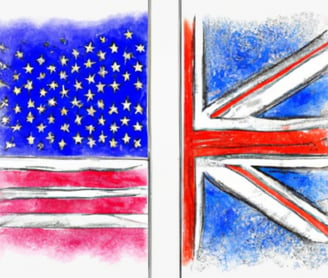
UK vs US English
... what's the big deal?
LANGUAGE
D. Barnes
6/9/20203 min read
Premise and Cultural Background
English is a widely spoken language and has many variations, with British and American English being the two most widely recognized. Although both are derived from the same origin, there are several differences in terms of pronunciation, grammar, vocabulary, and spelling that set them apart. The differences between British and American English can also be attributed to the cultural differences between the two countries. British English reflects the historical and cultural roots of the United Kingdom, while American English reflects the cultural melting pot of the United States. This has led to the development of distinct slang terms, colloquialisms, and idioms in both languages, which further sets them apart.
Pronunciation
One of the most noticeable differences between British and American English is the way words are pronounced. British English tends to be more formal and follows a strict pronunciation guide, whereas American English is more relaxed and often has a distinct twang. For example, the word "schedule" is pronounced "shed-yool" in British English and "sked-yool" in American English. Similarly, the word "herb" is pronounced "herb" in British English and "herb" in American English.
Vocabulary
There are several words that are used differently in British and American English. For example, "biscuit" in British English refers to a sweet baked good, whereas in American English, it refers to a savory cracker. "Lorry" in British English refers to a truck, whereas in American English, it is referred to as a "truck." Another example is the word "flats," which in British English refers to apartment buildings, whereas in American English, it refers to shoes.
Grammar
Grammatical differences between British and American English are not as noticeable as pronunciation and vocabulary differences, but they still exist. For example, British English tends to use the present perfect tense more often than American English, which tends to use the simple past tense. Additionally, in American English, collective nouns, such as "team," are often treated as singular, whereas in British English, they are treated as plural.
Spelling
Another noticeable difference between British and American English is the way words are spelled. There are several words that are spelled differently in both languages. For example, "colour" in British English is spelled "color" in American English, and "centre" in British English is spelled "center" in American English. Another example is the word "theatre," which is spelled "theater" in American English.
Punctuation
While the differences in punctuation between British and American English are minimal, it is important to understand the conventions of each variety to ensure clear and effective communication. Whether writing for an American or British audience, it is always advisable to follow the conventions of the target audience to avoid confusion, since, while minimal, they do still exist. Here are some notable ones:
Quotation marks: In British English, quotation marks are often referred to as "inverted commas" and are written as single quotes (‘ ’), whereas in American English, they are written as double quotes (" ").
Commas: In British English, commas are used to separate items in a list, whereas in American English, they are used to separate clauses and phrases as well.
Full stops (periods): In British English, full stops are placed outside the quotation marks, even if the full stop is part of the quotation, whereas in American English, the full stop is placed inside the quotation marks if it is part of the quotation.
Capitalization: In British English, the first word of a sentence and proper nouns are capitalized, whereas in American English, the first word of every sentence and every proper noun are capitalized.
Parentheses: In British English, parentheses are written as round brackets ( ), whereas in American English, they are written as square brackets [ ].
In conclusion, while both British and American English are derived from the same origin, there are several differences in terms of pronunciation, grammar, vocabulary, spelling, and punctuation that set them apart. These differences are largely due to the cultural, historical, and geographical differences between the United Kingdom and the United States. Despite these differences, both varieties of English are widely recognized and widely spoken, and they continue to evolve and change over time.


Our Address
(United Kingdom)
Innovord Solutions (P) Ltd,
1st Floor, 11/457, 'Anjali'
Railway Station Road
Tripunithura, Kochi
Kerala, India
Our Address
(India)
Email
info@innovord.com
Phone
UK: +44-7534148014
India: +91-9845675689
Reach Us
Our Address
(Canada)
Innovord Solutions Inc.,
Unit 38, 409 Joseph Street,
Port Elgin,
Ontario, N0H2C2,
Canada
Innovord Solutions Ltd,
10 Waterdown Road,
Royal Tunbridge Wells,
Kent TN48LE,
United Kingdom
